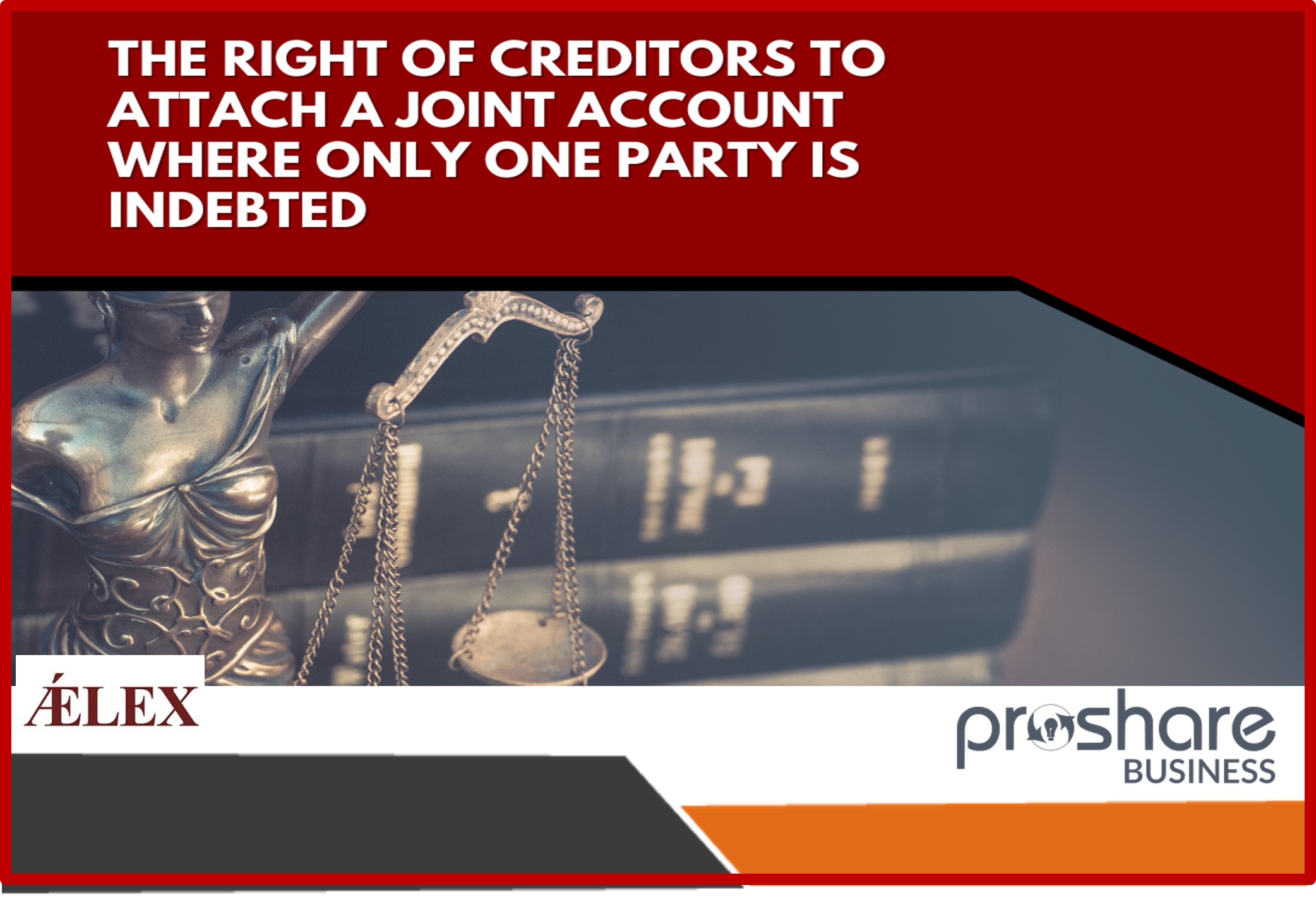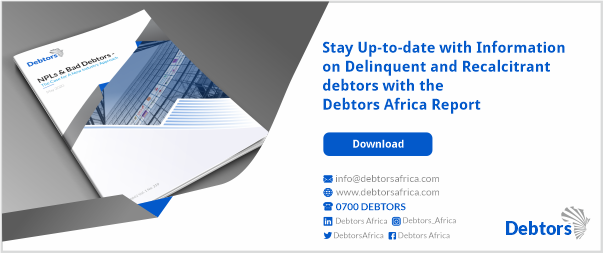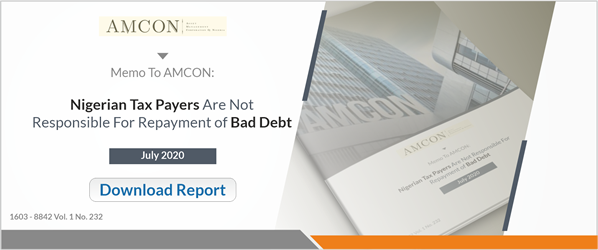Monday, May 10, 2021 / 05:40PM /AELEX/Header Image Credit: AELEX
Dr MartinTallhause looked out of his 15th-floor office window at the busy fa?â?ºade of thehustle and bustle of Ikoyi. He looked like he had just seen a ghost; worststill, he looked like he had just seen red; red on the bank account hemaintains jointly with his business partner, Mr Chip Munk. His account officerhad just informed him on the phone that pursuant to the Central bank ofNigeria's Operational Guidelines on Global Standing Instruction (GSI)Individual, ("GSI Guidelines" or the "Guidelines") [1]the joint account he maintains with Mr Munk for the purpose of poolingresources for their tech start-up has been debited.
Mr Chip isindebted to a Moneybag bank to whom he had granted a GSI mandate. Dr Tallhauseis not a party to that transaction; but because he maintains a joint accountwith Mr Munk, the funds in their joint account have been charged to satisfy thedebt owed by Mr Munk.
This articletherefore examines the foregoing scenario, especially with regards to thepowers of creditors to charge or levy enforcement of a judgement on a jointaccount maintained by a debtor and a third party.
Attachment of a Joint Account
A jointaccount is a bank account shared between two or more persons, natural orjuridical. While their contributions may not be the same, they have equalaccess to the account and equal obligations to pay the charges that ariseduring the use of the account. In other words, each one has a right to depositand withdraw from it without the consent of the other, subject to any specificmandate to the contrary. A creditor might choose to go after the funds in ajoint account either because it is easier to access or because a debt remainsunsatisfied even after charging or liquidating the other assets of the debtor.
The questionthat arises, therefore, is - can a creditor attach, garnish, or otherwiseenforce a judgement on an account a debtor jointly holds with a third party?The Central Bank of Nigeria (CBN), under the GSI Guidelines, has taken theposition that a creditor bank or Financial Institution can attach fundsstanding to the credit of a debtor in any account maintained by the said debtorin any Nigerian bank. This is provided that the said debtor has executed a GSImandate in favour of the bank. This applies only to individuals and notcorporates.
Thisrestricted application constitutes a significant source of frustration to banksand other financial institutions, mainly since loans to corporates constitutemore than 65 percent of the financial sector's average outstanding loans [2]. Thequestion as to whether a bank can attach a joint account belonging toindividuals is quite straightforward considering the CBN GSI guideline. Thequestion of the legality of such attachment, especially with regards to therights of a third party over such funds, is untested in court [3].
Anothersituation worthy of interrogation is one in which corporates, or a mix of anindividual and a corporate, operate a joint account. Where the creditors of oneof the parties seek to attach, through a garnishee proceeding, the fundsstanding to their joint credit, can such funds be attached by a court to thedetriment of a non-debtor party? [4] Sections88, 89 and 90 of the Sheriffs and other Process Act [5](SCPA), deal specifically with a situation where a third party has interest inan account that is subject to attachment by a judgment creditor. Section 88 ofthe SCPA provides viz:
Whenever inany proceedings to obtain an attachment of a debt it is suggested by thegarnishee that the debt sought to be attached belongs to some third person orthat any third person has a lien or charge upon it, the court may order suchthird person to appear and state the nature and particulars of his claim uponsuch debt.
It follows,therefore, that a third party has the right to address a court on theirinterests in a joint account if they so choose and if the court permits them.If they are successful in convincing the court as to the legitimacy of theirclaims, then the court will bar the execution of judgement on that account.
However, adifficulty arises out of the special nature of garnishee proceedings as thejudgment debtor is not a party to the garnishee proceedings. Where thegarnishee elects not to disclose the interest of a third party for any reason,such as its own interest or inadvertence, would an action lie against suchgarnishee in favour of the third party for such election or omission? Afterall, the status of a garnishee in such a proceeding is not one of advocate fora judgement debtor. Where a garnishee fails to inform a third party about theproceedings, what is the role of the court since the section above does notimpose a positive duty to disclose an encumbrance?
Although thelaw presumes the good faith of a garnishee, it does not leave the third partyat the mercy of the garnishee. The courts have therefore held in a plethora ofcases that, where a third party interest is disclosed in a garnisheeproceedings, the court has a duty to inquire into the said interest once it hasbeen brought to its knowledge by any means or at any stage of theproceedings see: Skye Bank Plc V Haruna& Ors (2014) LPELR - 41078 (Ca), Idosu Vs Ojikutu 14 WACA 88, A Barzasi VsB. Visinoni & Anor (1975) NNLR 6, Siemens Export KG Vs West German and NigerianTrading Co Ltd (1985-1989) NBLR 27 and, Ecobank Nig Plc Vs Ette (2014) LPELR23444.
It istherefore in the interest of a third party to approach the court and state thenature of his interest in such joint accounts if it has notice of a thirdparty's attempt to attach it. A problem arises where a third party has noknowledge of the garnishee proceedings on an account which he has an interest.The argument can be made that a court which is presented with an account whichon the face of it, is a joint account should direct that the second party notnamed as judgment creditor be put on notice. However, the court in Skye BankPlc v. Colombara [6] interpreted the word 'may' in section 88 of the SCPA to give the court the discretion to not call athird party to appear before it to state its interest. This suggests that acourt might not be willing to make such a universal doorway for everythird-party interest. However, it is our view that an interest as strong as ajoint account holder will be strong enough to persuade a court to order such anappearance.
While theright of the third party to be heard is well established by statute and caselaw, the standard of proof, or what constitutes proof of ownership of the fundsand what such a third party must prove to be discharged from the attachment isunclear. In some other jurisdictions,[7]there are clear rules about what kind of joint accounts maybe attached by acreditor. While the specifics of those rules cannot be covered in this article,it is worth noting that a court would usually consider the quantum ofcontribution by each party and the purpose for setting up the account aseligibility factors.
Thus, theamount of the funds in the account traceable to the contribution of the thirdparty is usually a safe place to begin. A creditor will only be entitled totake only up to the amount contributed by the debtor and not all the funds inthe account. Where it can be proved that a joint account is a convenienceaccount such accounts are ineligible for attachment by the creditors of one ofthe joint account holders in those jurisdictions. Such accounts can be createdby parents who add their children for convenience. So, while the children haveaccess to the funds, the ownership of the money remains with the parents.Another scenario where this is important is, where a financier elects to fundan account pursuant to a loan arrangement but decide instead of charging theaccount to set the account up as a joint account for the purpose of monitoringactivities on the account and decide how funds are spent in support of aproject. In both cases, a third party can show that the money in the account,is not directly traceable to the debtor and as such, does not belong to thedebtor.
Anotherapproach adopted in these jurisdictions is the creation by statute of an exemptionlist, specifying types of accounts or conditions where joint bank accounts arebeyond the reach of any creditor. A combination of all these exists as rules indifferent jurisdictions like the USA, the United Kingdom, Singapore, and manyothers.
The positionunder the common law as expressed in the English cases of Plunkett V BarclaysBank Limited 1936 2 Kb 107, 1936 1 All Er 635, and Hancork v. Smith, 41 CH.D456, is that a joint account cannot be garnished in respect of a debt by one ofthe parties.
Thus, whilethe case law in Plunkett indicates that a joint account cannot be garnished, itis suggested that a better approach to the issue is rules around quantum ofcontribution by each party to the joint account and, a limitation on the amountor type of joint account would better serve the interests of all parties. It isurged that this approach be adopted especially for the exercise of a rightpursuant to a contract without recourse to the courts.
Conclusion
The questionof the right of a creditor of one party to a joint account to attach or garnisha joint account for the purpose of satisfying a debt owed by only one of theaccount holders is not very clear. It is also unclear whether the CBN guidelineon GSI will stand judicial scrutiny. This guideline has the potential to workhardship against third parties whose funds are commingled with that of a debtorand even if ultimately the said third party prevails in court, the period forwhich they are denied access to the account may prove to be incapable ofrestitution.
The positionof the courts on the issue also leaves a lot to be desired. There is littlejudicial guidance on what a third party needs to prove to defeat an attempt togarnish their joint account. The legitimate claim of a creditor may also besubverted by the machinery of a joint account if the position as enunciated inPlunkett's case is given strict interpretation. It is submitted that clearrules around these need to be made to balance out the competing rights.
Footnotes
1. CentralBank of Nigeria Operational Instruction on Global Standing Instruction (GSI)Individual <https://www.cbn.gov.ng/Out/2020/CCD/CBN%20-%20Operational%20Guidelines%20on%20Global%20Standing%20Instructions%20GSI%20-%20Individuals.pdf>accessed on 15 April 2021. The GSI Guidelines provide a framework from whichfinancial institutions can recover bad debt from all accounts of the borrowerconnected to their BVN without recourse to the courts. It was introduced toreduce the incidences of Non-Performing Loans (NPLs). This applies only toindividual debtors and the protocol for a GSI for corporate debtors iscurrently being contemplated. See the African Business No reprieve forNigeria's chronic loan defaultershttps://african.business/2020/10/finance-services/no-reprieve-for-nigerias-chronic-loan-defaulters/accessed 12 April 2021.
2. Debtors Africa Report: NPLs and Bad Debtors-Thecase for a new industry Approach<https://proshare.co/articles/list?menu=Reports
3. This question will formthe crux of a follow-up article.
4. Ibid (n2)
5. Sheriffs and Civil ProcessAct cap S6 Laws of the Federation of Nigeria (LFN) 2004
6. (2015) 5 NWLR pt1453
7. Fortis Law, GarnisheeOrders - The threshold for creditors to claim on joint bank accounts GarnisheeOrders - The threshold for creditors to claim on joint bank accountshttps://www.lexology.com/library/detail.aspx?g=dbae4051-88a2-4315-9173-bd7d4398b873 accessed 13 April 2021,Hg.org Legal, Can a Joint Account Be Garnished?< https://www.hg.org/legal-articles/can-a-joint-account-be-garnished-34869> accessed 12 April2021
Related News
1. Of First Bank and Bad Debtors;A System's Throbbing Headache
2. Senate Passes AMCON AmendmentBill to Aid Quicker Assets Disposal
3. No Wind-up Court Order onStarTimes in Nigeria, Legal Proceedings Ongoing in Hong Kong
4. StarTimes Facing a Winding-UpCourt Order for Rights Debts
5. The Ecobank and Airtel Story:Surviving a Contingent Liability and Equity Sale
6. FHC Upholds Mareva Injunctionin Access Bank Case, Bank to Hold Onto SEPLAT's Assets
7. Seplat's Navigation of FundingOptions, Dual Listings, Eurobond and the Cardinal Drilling Loan
8. Honeywell to Seek SupremeCourt's Review of Court of Appeal Decision on Ecobank Credit
9. SEPLAT and Its Access BankNemesis - Plugging the Governance Gap
10. Why Publishing Names ofDelinquent Bank Debtors is in the Public Interest
11. The CBN Directive onPublication of Delinquent Bank Debtors: Some Data Privacy Ramifications
12. SEPLAT Plc Refutes Being Partyto Cardinal Drilling Services Loan with Access Bank and O Networks Limited and ETIAppeal Court of Appeal Judgement on Disputed Airtel Shares
13. AMCON Takes Over JimohIbrahim's Prime Assets Over N69.4bn Debt
 Lagos, NG • GMT +1
Lagos, NG • GMT +1











 1161 views
1161 views









 Sponsored Ad
Sponsored Ad
 Advertise with Us
Advertise with Us







